I'll be honest. I almost didn't even bother to watch the third season of Star Trek: Picard. The first 2 seasons were so bad that the thought of watching another season almost made me physically ill. It was bad enough to have beloved characters like Picard, Seven of Nine, Hugh, and Q treated the way that they were, but now season 3 threatened to treat the entire cast of Next Generation with the same level of disrespect. It was not something that I wanted to willingly subject myself to.
Even after I saw some positive reactions to the first couple episodes, I still didn't bother watching. After all, the first episode or 2 of both of the previous seasons received generally positive reviews before nose-diving off the deep end into a pool of shit. But then the season reached the halfway mark, and I was still seeing almost entirely positive buzz surrounding it -- and not just from a few shill social media influencers, but from pretty much everybody. At that point, my partner started expressing interest in watching it, so I finally caved and started watching, with a bottle of Excedrin next to me, just in case.
I kept my guard up throughout the first few episode. I fully expected that it would start off relatively strong before inevitably tripping over its own 2 feet. But that kind of ... never really happens this time around. Yes, there is a big "mystery box" tease throughout the show that had the hallmarks of J.J. Abrams and Alex Kurtzman plastered all over it, and that had me very worried for where things would end up. And yes, that mystery box does turn out to be an 11th-hour bait-and-switch.
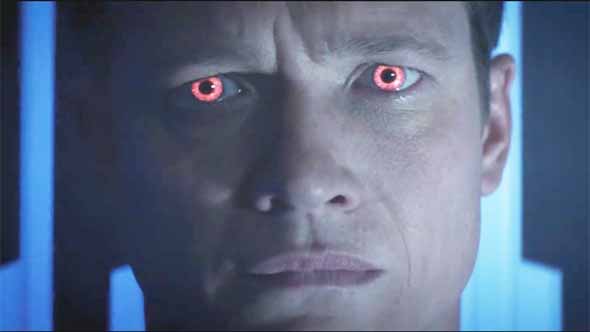 © CBS, Paramount
© CBS, Paramount
The "Mystery Box" of Jack Crusher had Alex Kurtzman's fingerprints all over it.
But even though the bait-and-switch plot-twist ends up being about as silly as anything that was in the previous 2 seasons, this one actually kind of works. It's something that is actually quite clearly telegraphed throughout the entire show, starting from the opening scenes. But it also has some clever mis-direction and red-herrings to keep the twist from ever feeling truly certain. And instead of being something pulled out of the writers' asses (like robot tentacle-monsters from another dimension), this twist is something that is both firmly grounded in Star Trek history and lore, and which logically follows from previous series.
It's almost like the people who wrote this season of Picard actually, like, I don't know, watched some episodes of Star Trek before coming up with this plot.
It ends up making a world of difference. I'm still not "in love" with Star Trek: Picard season 3. I don't think it is particularly great "Star Trek". It still falls firmly into the category of "Dark Trek", and is still about vengeful bad guys with super-weapons. But it is at least competently-plotted and scripted this time around. It is tightly themed, is loaded with set-ups and pay-offs, and shows our characters growing an changing in ways that are consistent with their original characterizations. Season 3 of Picard is basically an extended Next Generation movie, and it's definitely better than Nemesis, and probably at least as good as any of the other Next Generation movies (keeping in mind that I'm not a big fan of First Contact). [More]
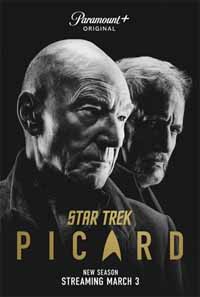 © CBS, Paramount
© CBS, Paramount
I'm not going to wait till the end of the review this time to say this. I want to get it out of the way right up front. Paramount needs to get some actual science fiction writers (preferably ones who have worked on Star Trek in the past) and science and technical consultants into the writing rooms for their Star Trek shows. And furthermore, the TV writers in the room need to listen to those sci-fi writers and consultants. Not only does the second season of Star Trek: Picard fall apart due to sloppy, incoherent plotting, but it also seems painfully unaware of certain parts of Trek canon and also of how metaphor and allegory are supposed to work.
I previously wrote an outline of my ideas for re-writing the first season of Picard to retain all the good ideas, get rid of the bad, and create something that more closely resembles the type of Star Trek that I want to see. But I don't think I can do that for this season of Picard because nothing in this show makes any sense.
I was actually kind of optimistic at the start. The first 2 episodes were actually not bad, and seemed to go out of their way to try to rectify some of the complaints that were levied against season 1. This time around, the Federation is not depicted as racist cowards who are unwilling to help a refugee population fleeing from a natural catastrophe. In fact, they give long speeches about the duty of Starfleet to explore the unknown and about the value of diversity and inclusion. We still see a version of the Federation that is racist and xenophobic, but this time, it's in the form of a parallel reality fascist Confederation. The first episode is even about a starship investigating a strange anomaly in space. This is an OK start. This actually kind of sort of looks like Star Trek.
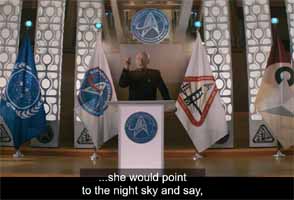 © CBS, Paramount
© CBS, Paramount
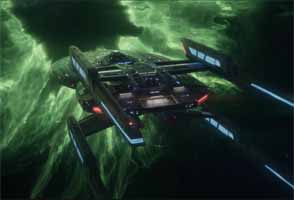 © CBS, Paramount
© CBS, Paramount
Season 2 starts off promising, with the Federation looking more like what I'm used to,
and the opening episode seemingly including an "anomaly of the week".
Problematic developments
But even from this first episode, the cracks in the storytelling are already exposed. Problem number one is that all the important character development happened off-screen between seasons. Rios apparently got over his trauma, went back to Starfleet, and was given a captaincy. He even broke up with Jurati. Good riddance. Seven and Raffi also had a relationship and then a falling-out -- all off-screen. Raffi developed some sort of proxy-parent / mentor relationship with Elnor, who also joined Starfleet, and is somehow already on a deep space assignment less than a year after enlisting. Meanwhile, Larin's husband died, and she's secretly fallen madly in love with Picard, who is now an instructor or headmaster at Starfleet Academy. Soji is an ambassador between the synths and the Federation and isn't involved in season 2 at all, despite having been the lynchpin of the first season.
The character development that happens during season 2 isn't any better. This season Fundamentally changes Picard's character. He was already unrecognizable as the same Jean-Luc Picard from The Next Generation in season 1, but I'm willing to give a pass due to the decades of time in between. People change over decades, especially if their life circumstances have also dramatically changed. Picard went from being a Starfleet captain exploring the galaxy, to sitting around his chateau with his Romulan not-slaves, sipping wine and petting dogs. Fine, I get that he's mellowed since the end of TNG.
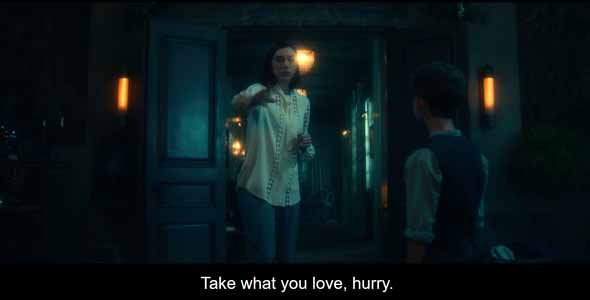 © CBS, Paramount
© CBS, Paramount
Picard's past is ret-conned to include a mentally ill mother and toxic home environment
being the reason he left home for the stars.
But season 2 actually goes back and retcons Picard's entire life in ways that reframe his entire character from TNG. He isn't the consummate explorer who joined Starfleet because of a genuine love of science and discovery. Now, he joined Starfleet to get away from a toxic home environment. It's just like how reboot James Kirk didn't join Starfleet because of a desire to explore, but because he was double-dog-dared to be a better Starfleet officer than his dead dad. But at least in Kirk's case, that is a different character in a different timeline. In Picard's case, we're supposed to believe this is the same Picard that we've known all along.
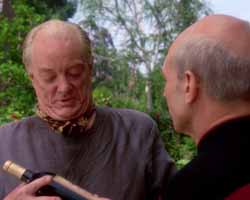 TNG s4 e2 "Family", © CBS, Paramount
TNG s4 e2 "Family", © CBS, Paramount
Where was Robert during all this family drama?
Also, did the writers not know that Picard had an older brother? Where was Robert Picard during all this drama with their parents?
And Seven of Nine has apparently regressed from any of her character development from the previous season, as she's back to mindlessly killing Borg and insisting that they "aren't human anymore". This is despite the fact that both she and Picard are case in point examples of former Borg being rehabilitated, and despite her sorrow of the destruction of the Borg Rehabilitation Project in season 1.
The lynchpin of this season is a young astronaut who suffers from crippling depression. This is despite the fact that NASA has pretty extensive screening and training processes that would either rule out someone who is not emotionally stable enough to do the job, or would train them to the point that they do the job without a second thought. This is an example of how having science and technology consultants in the writing room would help make the story more believable. [More]
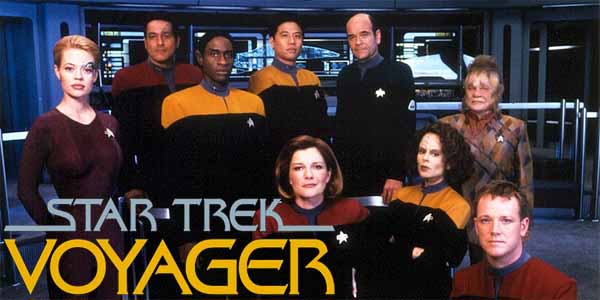
Don't worry, I'm almost done venting my frustrations with Star Trek: Voyager. The first post was about how the show failed to build on its foundations, and the second post was about how the show was a Next Gen copy-cat. This will be the third (and last) post exclusively dedicated to bashing on Voyager. If I decide to write anything further about Voyager, it will probably be about the things that I actually like about the series. I want to re-emphasize that I don't hate Star Trek: Voyager as a TV show. I feel that it was very mediocre, and I'm disappointed that it failed to deliver on its potential.
Even though I don't hate the series as a whole, the one thing that I actually do absolutely loathe about the series is its finale: "Endgame".
Voyager's "Endgame" is a lazy, contrived, cop-out of a finale.
Endgame is one of the worst episodes of Voyager, and might very well be one of the worst episodes in all of Star Trek! OK, it's not "The Omega Glory" or "The Alternative Factor" or "Sub Rosa" bad, but it's pretty terrible! I honestly do not understand how it keeps making lists of "best Voyager episodes". About the only redeeming factor of this episode (in my mind) is that the inclusion of Klingon Captain Korath (and his possession of a time-travel device) indirectly cannonizes Star Trek: the Experience -- and kind of indirectly canonizes me!
"Endgame" is a schlocky action adventure that basically perfectly represents all of Voyager's weaknesses as a show. It's too dependent on its TV-budget CGI Borg special effects. It makes Seven of Nine out to be the most important character on the show (she is the most important character, but the show doesn't have to continually force it down our throats). It's selfish and pretentious. It's fan-servicy.
The inclusion of Captain Korath's time travel device indirectly canonizes Star Trek: the Experience.
"Endgame" is too concerned with its gimmick to really care much about the characters. So much so that it literally manifests a significant (but ultimately arbitrary) romance between two main characters out of nowhere with no build-up at all and in complete contrast to any development that had already been happening. Even the actors thought this romance sub-plot came out of nowhere and blindsided them!
Lastly, "Endgame" is also a rehash of an earlier Voyager episode: "Timeless" (in which Harry Kim goes back in time to save Voyager from crashing), while at the same time trying to be a lazy rehash of TNG's brilliant and beautiful finale "All Good Things..." -- but without the brilliance or beauty.
... [More]
c6c78dcf-37de-431a-b544-93a00cb99a58|4|4.0
Tags:Star Trek, Star Trek: Voyager, U.S.S. Voyager, Endgame, series finale, Delta Quadrant, Starfleet, Borg, Kathryn Janeway, Seven of Nine, Jeri Ryan, Chakotay, Tuvok, Borg Queen, Lyndsay Ballard, Ensign Jetal, Lon Suder, Korath, Star Trek: the Experience, pale blue dot

In my last post, I vented some of my frustrations with Star Trek: Voyager. Primarily, I ranted about how the series mostly failed to follow through with its central premise of being about the ship being lost and isolated on the other side of the galaxy. But I still have more complaints with Voyager. A side effect of the show not following its "lost and alone" premise to its logical conclusion, the show ended up feeling like it was trying too hard to be a Next Generation copy-cat.
Steve Shives also brought up this complaint in his Youtube video "What's My Problem With Voyager?", and I echo the criticism. Voyager had the frustrating habit of retelling stories that had already been told (usually better) in Next Generation. Star Trek shows have always repeated archetype characters, but TNG and Deep Space Nine were very good about paying homage to the earlier shows, without outright copying them.
Many characters feel like slight variations of characters from TOS and TNG.
For example, it could be argued that Data in TNG is a copy-cat of Spock. Dr. McCoy, after all, frequently referred to Spock as a "computer", and Mr. Data is [literally] a computer. But Data isn't a copy-cat of Spock. He's actually more a reflection of Spock (though, admittedly, Spock's arc in the movies and in "Unification" does paint him as being more similar to Data). Spock (in the Original Series) derided his humanity and fought very hard to subdue and quell it. Spock was like a Dr. Jekyll who thought his human half was the monstrous Mr. Hyde. Data, on the other hand, inverts this concept and is more of a Pinocchio (which Riker explicitly spells out for us in "Encounter At Farpoint").
Data wasn't a copy of Spock, he was an inverted reflection.
Also, Spock was dueling with his human half throughout the Original Series and into the movies. That's a dynamic that isn't present in Data at all. That dynamic is present, however, in Worf! Then, of course, there's the whiz kid element of Spock's character, which was transcribed onto Wesley in TNG. So TNG took inspiration from the Original Series' most popular character (Spock), but instead of copying him with minor variations, it split Spock's attributes into multiple characters.
[More]
2c5a81e1-f421-43b4-a73f-c4e9164e3c2a|0|.0
Tags:Star Trek, Star Trek: Voyager, U.S.S. Voyager, Star Trek: the Next Generation, Star Trek: Deep Space Nine, Delta Quadrant, Starfleet, Maquis, Kazon, Hirogen, Borg, Kathryn Janeway, Seven of Nine, The Doctor, Kes, Chakotay, Tuvok, Neelix, Tom Paris, B'Elanna Torres, Harry Kim, Borg Queen, Boothby, Reginald Barclay, Q, Data, Spock, Worf, Quark

A couple years ago, I wrote about the show that I wish Star Trek: Enterrpise had been. Enterprise completely dropped the ball as a prequel and as a bridge between our time and the time of the original Star Trek, by screwing up at fundamental levels of its conception and design. But Enterprise wasn't the first Star Trek series to do this. Its immediate predecessor, Star Trek: Voyager had already started this trend, which has sadly carried onto into all incarnations of Star Trek since.
I rarely talk much about the reasons that I think Voyager is an inferior show to Next Generation and Deep Space Nine. The closest I've come so far was my rant about the Borg, a brief retrospective as part of the 50th anniversary, and a few off-hand jabs at Voyager in some of my other Star Trek posts. This past summer, Steve Shives published a video on Youtube called "What's My Problem with Voyager?" in which he vents some of the same complaints that I have. Steve has some pretty excellent content on his channel, and I highly recommend checking him out if you enjoy my Star Trek content. Anyway, his video inspired me to vent some of my own frustrations with Voyager that he either didn't cover, or for which I feel I have additional insight.
Steve Shives, creator of "Trek, Actually", posted his problem with Voyager on Youtube.
Just like Steve, I want to start by stressing that I don't hate Star Trek: Voyager. I don't think it's as good as its predecessors, but it's perfectly watchable.
When I first started drafting this, it was going to be a short list of complaints. However, as I re-watched the show, the post ballooned with examples. As such, I'm going to split this into several parts. This first part will probably be the longest (so bear with me please) and will focus on what I perceive as a failure of Star Trek: Voyager to adequately build upon the foundations of its premise. The next post will be about how I perceive Voyager as a lazy copycat of The Next Generation.
At a conceptual level, Voyager begins with two foundational pillars: the ship is stranded on the opposite end of the galaxy; and a quarter of the crew has been replaced by Maquis freedom fighters and terrorists instead of trained Starfleet personnel. The show almost completely whiffs on both of these concepts. I would say that there are also two other foundational pillars of the show, but each of these only lasts for half the series. In the first half of the series, a major source of conflict is the fact that Voyager possesses technology far superior to the races and civilizations that it encounters; thus, bringing the Prime Directive into sharp focus and testing the crew's resolve to obey the Directive in such desperate circumstances. In the second half of the series, we have the Borg (which I will be discussing again).
Voyager is isolated and alone, without the resources of the Federation or a starbase.
All four of these are very strong concepts and well worth exploring. Unfortunately, Voyager almost completely abandons its two initial foundations, and (again) completely whifs when it comes to the Borg (though, admittedly, a big part of that is Star Trek: First Contact's fault). The only concept that Voyager really sticks the landing on is the idea of technological disparity between Voyager and its foes in the first couple seasons. [More]
f844da9a-60ad-4a3a-b28a-f06121578938|5|1.8
Tags:Star Trek, Star Trek: Voyager, Star Trek: Enterprise, U.S.S. Voyager, Delta Quadrant, Starfleet, Maquis, Kazon, Hirogen, Borg, Kathryn Janeway, Seven of Nine, Jeri Ryan, The Doctor, Kes, Chakotay, Tuvok, Neelix, Tom Paris, B'Elanna Torres, Harry Kim, Joe Carey, Lyndsay Ballard, Ensign Jetal, Borg Queen, Gilligan's Island, Prime Directive, Steve Shives
|

| 12 | | | | | | | 60 | | 11 | | | | | | | 55 | | 10 | | | | | | | 50 | | 09 | | | | | | | 45 | | 08 | | | | | | | 40 | | 07 | | | | | | | 35 | | 06 | | | | | | | 30 | | 05 | | | | | | | 25 | | 04 | | | | | | | 20 | | 03 | | | | | | | 15 | | 02 | | | | | | | 10 | | 01 | | | | | | | 05 |
|